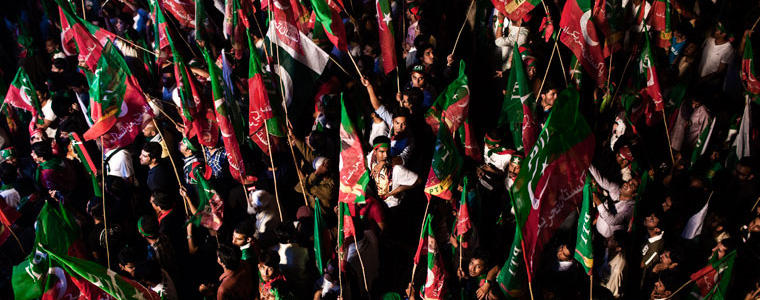USIP’s Andrew Wilder and Moeed Yusuf and other experts say broad support for the prime minister, combined with local wins by key opponents, might generate the right combination to force tough decisions that could move Pakistan forward.

The decisive victory of former Prime Minister Nawaz Sharif’s party in Pakistan’s parliamentary elections might give him the public support he needs to confront tough decisions and work with opponents to spur much-needed progress in governance and services, USIP experts and others said during a panel discussion this week.
Sharif’s Pakistan Muslim League (PML-N) appears to have won by a far larger margin than expected, despite an energetic third-party campaign by former cricket player Imran Khan and isolated allegations of fraud, according to news reports. The palpable excitement surrounding this year’s campaigning overpowered concerns about attacks and threats of violence to generate a turnout of 60 percent, compared with just 44 percent in 2008.
“The result is fairly good if you’re going to give a government a chance of governing right,” said Moeed Yusuf, South Asia advisor to the U.S. Institute of Peace during the May 14 discussion at USIP. “He doesn’t need any other party to join him, which means that he really has no excuse not to deliver now.”
Still, the success of Khan’s Pakistan Tehreek-e-Insaf (PTI) party in areas such as Khyber-Pakhtunkhwa Province in the tribal belt marked the first time in a long time that a “genuine third force” emerged as a contender in the country’s elections, Yusuf said. Pakistani politics have long been dominated by the PML-N and President Asif Ali Zardari’s Pakistan People’s Party (PPP).
Khan “really got into Sharif’s head,” and influenced the former premier’s campaign rhetoric, said Arif Rafiq, an adjunct scholar with the Middle East Institute.
Khan’s achievement at local levels in Khyber-Pakhtunkhwa, the PPP’s in Sindh Province and the likelihood of a coalition in Baluchistan Province may provide just enough counterweight to compel Sharif to work with them in achieving necessary changes, Yusuf said.
“I think it really does create a very good mix of allowing him space to make policy changes while having to work with alliances at the provincial level,” Yusuf said.
Andrew Wilder, the director of Afghanistan and Pakistan programs at USIP, said the phenomenon of the PPP, which previously won seats in all four provinces, being effectively reduced to a party of rural Sindh, combined with the PML(N) winning nearly all of its seats in the Punjab, creates a potentially damaging situation where there are no longer any political parties in Pakistan that cross ethnic lines with national support. Instead, all major parties appear more ethnically based, with the possible exception of Khan’s PTI which didn’t do as well as some had expected. Pakistan’s minority ethnic groups and smaller provinces often resent what they perceive to be Punjabi domination. To now have a “Punjabi party” dominate national politics could exacerbate this sense of Punjabi domination.
Zardari’s term, which expires later this year, has been weakened by allegations of corruption and the failure of governing authorities to thwart the threat of terror attacks and provide basic services such as regular supplies of water and electricity.
Another factor to watch will be the relationship between Sharif and the military. The army ousted him from a second term in a 1999 coup led by army Chief of Staff General Pervez Musharraf, who later became president, serving for seven years until he resigned under pressure in 2008 after democratic elections. Sharif returned from exile in Saudi Arabia in 2007.
In his campaign, Sharif emphasized civilian control over national security policymaking, and he might try to strengthen mechanisms such as the defense committee of the Cabinet, Rafiq said.
In this year’s election, young people and women were particularly engaged and energized, Yusuf said.
``I have never seen the Pakistani citizenry so excited about elections as I did in the last week in the run-up to the elections,” he said, calling the developments “fairly heartening and not easily reversible.”
The State Department’s Safiya Ghori-Ahmad was part of the U.S. Embassy’s election monitoring delegation in Lahore, Pakistan’s second-largest city and the capital of Punjab Province in the east, and visited two dozen polling stations. On the flight from Dubai to Lahore, she could feel the election fervor.
“It seemed like the entire flight was wearing Imran Khan T-shirts, chanting and singing,” said Ghori-Ahmad, the political team leader on the Pakistan desk in the State Department’s Office of the Special Representative for Afghanistan and Pakistan. “Many of those were traveling back from the [Persian] Gulf or even the U.S. and the U.K. to vote for Imran Khan.”
The election commission’s organization and procedures, the professionalism of the police and military, and the close monitoring of political parties’ polling agents were “very impressive,” she said. Voters stood patiently in line despite temperatures of 108 degrees Fahrenheit, she said.
“The women’s lines were just as long as the men’s lines,” Ghori-Ahmad said. “I did feel everywhere I went that there was this sort of spirit of working together towards a democratic process.”
Still, violence in the run-up to the election and in Karachi and Balochistan on election day combined with occasional allegations of vote rigging to mar official overall assessments. The U.S. hasn’t yet declared the election free and fair, but rather concluded that it “highlighted Pakistan’s commitment to a strong, democratic process by candidates, voters and political parties,” Ghori-Ahmad said. She added that “the pre-election violence did distort the playing field in certain areas.” The U.S. has said some procedural issues still need to be addressed.
She commended Sharif for calling for strengthening ties with the U.S.
“There’s a commitment to work through the tough issues on both sides,” she said.